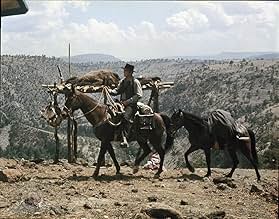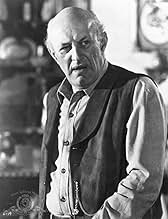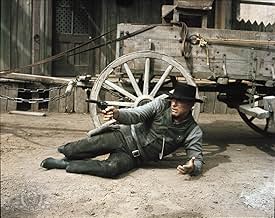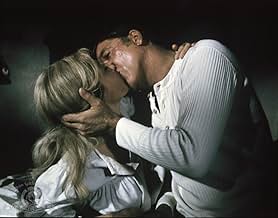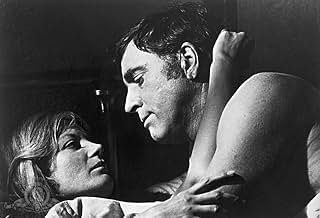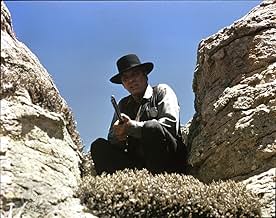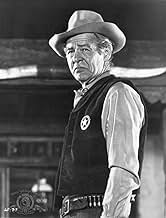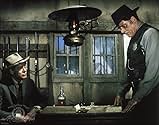CALIFICACIÓN DE IMDb
7.0/10
6.6 k
TU CALIFICACIÓN
Un agente de la ley de Bannock llega el sábado para detener a todos los ganaderos cuya salvaje celebración del año anterior se saldó con la muerte accidental de un anciano.Un agente de la ley de Bannock llega el sábado para detener a todos los ganaderos cuya salvaje celebración del año anterior se saldó con la muerte accidental de un anciano.Un agente de la ley de Bannock llega el sábado para detener a todos los ganaderos cuya salvaje celebración del año anterior se saldó con la muerte accidental de un anciano.
- Dirección
- Guionista
- Elenco
William Watson
- Choctaw Lee
- (as William C. Watson)
- Dirección
- Guionista
- Todo el elenco y el equipo
- Producción, taquilla y más en IMDbPro
Opiniones destacadas
I rather feel the original "review" on the database misses the point of this dark film. The notion that the community is best served by a rigid, inflexible determination to enforce the letter of the law under all circumstances is indeed the view espoused by the film's main character (played with consummate skill by Burt Lancaster) but the message of the film is surely to point out the limitations of such a view.
Towards the end of the film the Marshall is offered another vision - of a life that contain more than the vendetta, the manhunt, and the inevitable killing that follows. Instead he is tempted by the possibility of a life that offers love, humanity and peace. Unable to change his spots, however, he deliberately throws all that away in a final, senseless act of violence when he shoots in the back a frightened and basically harmless man who is trying to run away - a senseless, brutal and completely unnecessary act of judicial murder. It bears a great resemblance in fact to Harry's similar cold-blooded and pointless execution of his terrorist fugitive at the end of "Harry's Game" and similarly to that, its effect is to arouse disgust at the perpetrator and to alienate our sympathies from what we had previously felt was the "right" side, and to question whether it had really been so "right" all along. The purpose, one feels, of this final killing was not because there was any need for it, but simply to demonstrate the Marshall's defiance of his critics and his determination to continue in the path he had previously followed.
To my mind the film is an intelligent critique of the whole notion of the missionary self-righteousness of this attitude that can arise among self-appointed guardians of the public good, whose original high standards and pure motives are eroded by the violence and the basic inhumanity of the methods they use until they become - as Burt Lancaster actually states in specific terms during the film - just people who are good at killing other people. Siilar themes were explored earlier in "The Searchers" (1956) and "Hang 'em High" (1968) and later in "Unforgiven" (1992) but the message was best expressed to my mind by Peter Shaffer n his play "The Royal Hunt of the Sun" where the young, idealistic but inexperienced squire, Martin, tells his master the conquistador Pizzarro how he feels that a "noble reason" can make the violence of war "glorious". Pizzarro replies: "Give me one reason that stays noble once you start hacking off limbs in its name".
Towards the end of the film the Marshall is offered another vision - of a life that contain more than the vendetta, the manhunt, and the inevitable killing that follows. Instead he is tempted by the possibility of a life that offers love, humanity and peace. Unable to change his spots, however, he deliberately throws all that away in a final, senseless act of violence when he shoots in the back a frightened and basically harmless man who is trying to run away - a senseless, brutal and completely unnecessary act of judicial murder. It bears a great resemblance in fact to Harry's similar cold-blooded and pointless execution of his terrorist fugitive at the end of "Harry's Game" and similarly to that, its effect is to arouse disgust at the perpetrator and to alienate our sympathies from what we had previously felt was the "right" side, and to question whether it had really been so "right" all along. The purpose, one feels, of this final killing was not because there was any need for it, but simply to demonstrate the Marshall's defiance of his critics and his determination to continue in the path he had previously followed.
To my mind the film is an intelligent critique of the whole notion of the missionary self-righteousness of this attitude that can arise among self-appointed guardians of the public good, whose original high standards and pure motives are eroded by the violence and the basic inhumanity of the methods they use until they become - as Burt Lancaster actually states in specific terms during the film - just people who are good at killing other people. Siilar themes were explored earlier in "The Searchers" (1956) and "Hang 'em High" (1968) and later in "Unforgiven" (1992) but the message was best expressed to my mind by Peter Shaffer n his play "The Royal Hunt of the Sun" where the young, idealistic but inexperienced squire, Martin, tells his master the conquistador Pizzarro how he feels that a "noble reason" can make the violence of war "glorious". Pizzarro replies: "Give me one reason that stays noble once you start hacking off limbs in its name".
This movie stands out as one of the best of a subgenre that doesn't have a lot of great movies representing it. The Post-Western Westerns starting coming out in the mid-sixties until Westerns were hard to come by during the mid-seventies.
These "modern" westerns are distinguished by turning the "white hat good guy" and "black hat bad guy" on their ear. The good guys are not only not perfect, but ruefully flawed, and the bad guys are often people who made mistakes along the way and would not be a threat to society if they were left alone. Examples of other "modern" westerns are Unforgiven (The Clint Eastwood movie), Hang 'Em High (notice a pattern- another Eastwood movie), and Dances With Wolves.
Lancaster's Marshall Maddox is doing his job, but at this stage in his career, he is a walking, talking, killing machine who is ready to kill anyone who gets in his way, and some people who want very much to get out of his way. He is typical of the modern western. Where older westerns emphasized clear moral and ethical boundaries, modern westerns portray a world much less certain and easy to navigate. A world full of shadows and lots of gray ambiguities.
This is a perfect representation of how people felt in 1971. This is a very good film.
These "modern" westerns are distinguished by turning the "white hat good guy" and "black hat bad guy" on their ear. The good guys are not only not perfect, but ruefully flawed, and the bad guys are often people who made mistakes along the way and would not be a threat to society if they were left alone. Examples of other "modern" westerns are Unforgiven (The Clint Eastwood movie), Hang 'Em High (notice a pattern- another Eastwood movie), and Dances With Wolves.
Lancaster's Marshall Maddox is doing his job, but at this stage in his career, he is a walking, talking, killing machine who is ready to kill anyone who gets in his way, and some people who want very much to get out of his way. He is typical of the modern western. Where older westerns emphasized clear moral and ethical boundaries, modern westerns portray a world much less certain and easy to navigate. A world full of shadows and lots of gray ambiguities.
This is a perfect representation of how people felt in 1971. This is a very good film.
It's crazy the way some films get labeled "brilliant" while others get ignored just because of bad timing or poor studio backing or any # of things.
I'm not a fan of Westerns. I don't consider this a Western. I consider it a wonderfully written, directed, and acted work of art.
Gerald Wilson's script, and its interpretation by the three leads, is so skillful that it functions almost as a poem on the themes of "man," "animal," "law," and euphemism.
Micheal Winner's direction is beyond good. Every cut--early on he uses many overlays, then as the film builds he uses jarring smash cuts--is breathtaking in its thoughtfulness and thematic effect. And he knows when to lay off the music. An eerily quiet early showdown scene with Burt Lancaster, Albert Salmi, and Richard Jordan (with Robert Ryan in the background) is probably the most creative and effective such scene I've ever witnessed, Leone notwithstanding.
Then there's the acting. Lancaster is THE great underrated American actor, and it's because so many of his best performances came after he'd turned 50. I truly think this is his best. He says so much with his eyes, and especially with a tiny flutter or break in his voice. The range he achieves within this supposedly rigid character is phenomenal. From the knockout first scene between him and Ryan, to the touching scenes between him and Sheree North--you'll never see a sadder face than his when North gets out of the bed--to the scene by the river with Jordan, he creates a full character simply by being a great actor. No gimmicks or wackiness. He just out-acts anyone on the screen today.
Ryan equals Burt's performance. This is the best of the ten or so Ryan performances I've seen. Like Lancaster as he aged, Ryan is unafraid to play an aging, weakening character. Seeing him come to life briefly when he takes on a "Bronson man" is thrilling.
Lee J. Cobb has less to do but does a heck of a lot with it. The supporting actors are, to a person, superb. But special kudos must go to Richard Jordan.
This is a film that challenges the macho stereotype and finds it wanting. Lancaster's character offers a complex alternative. An absolute must-see. Tremendous script, unparalleled acting, superb directing. Oh, and the locations are just breathtaking. It's criminal that there's no true widescreen of Lawman available. Anyway, SEE IT.
I'm not a fan of Westerns. I don't consider this a Western. I consider it a wonderfully written, directed, and acted work of art.
Gerald Wilson's script, and its interpretation by the three leads, is so skillful that it functions almost as a poem on the themes of "man," "animal," "law," and euphemism.
Micheal Winner's direction is beyond good. Every cut--early on he uses many overlays, then as the film builds he uses jarring smash cuts--is breathtaking in its thoughtfulness and thematic effect. And he knows when to lay off the music. An eerily quiet early showdown scene with Burt Lancaster, Albert Salmi, and Richard Jordan (with Robert Ryan in the background) is probably the most creative and effective such scene I've ever witnessed, Leone notwithstanding.
Then there's the acting. Lancaster is THE great underrated American actor, and it's because so many of his best performances came after he'd turned 50. I truly think this is his best. He says so much with his eyes, and especially with a tiny flutter or break in his voice. The range he achieves within this supposedly rigid character is phenomenal. From the knockout first scene between him and Ryan, to the touching scenes between him and Sheree North--you'll never see a sadder face than his when North gets out of the bed--to the scene by the river with Jordan, he creates a full character simply by being a great actor. No gimmicks or wackiness. He just out-acts anyone on the screen today.
Ryan equals Burt's performance. This is the best of the ten or so Ryan performances I've seen. Like Lancaster as he aged, Ryan is unafraid to play an aging, weakening character. Seeing him come to life briefly when he takes on a "Bronson man" is thrilling.
Lee J. Cobb has less to do but does a heck of a lot with it. The supporting actors are, to a person, superb. But special kudos must go to Richard Jordan.
This is a film that challenges the macho stereotype and finds it wanting. Lancaster's character offers a complex alternative. An absolute must-see. Tremendous script, unparalleled acting, superb directing. Oh, and the locations are just breathtaking. It's criminal that there's no true widescreen of Lawman available. Anyway, SEE IT.
This is perhaps the best of those enigmatic Michael Winner productions that focus the plot on the emotions and personalities of the protagonists of the film. I love Michael Winner productions. They are never shot in a studio; and his realism is virtually unapproachable by any other director of the time.
Lawman is a story of pride,arrogance and people fixed into paths of life which they cannot change. Burt Lancaster is sterling representing "The Law"; a force that cannot be swayed. He desires, or thinks he desires, to be something else, but he is indeed the law, and cannot escape his fate. The characters of the town, the men he comes to arrest for a killing, all follow their own ordained paths. Because not one of them can, or will, bend or accept the events that are occurring, they all converge on the final climax that is one of the greatest statements of human futility that I have ever seen in a film. The climax of this story is fantastic, and almost totally unexpected. No one should spoil it for you, even a little.
There are a number of truly great character actors in this film, and each gives a flawless performance. In True Michael Winner form, the action is stunning and the violence is portrayed with all the realism that shows how awful and devastating it can be. This is a gritty, but deep story that holds one in its grasp without pause. I highly recommend it.
Unfortunately, Lawman is a rare film; almost never broadcast. If you are fortunate enough to find a copy for rent,or purchase, do so with all haste. It's a Winner!
Lawman is a story of pride,arrogance and people fixed into paths of life which they cannot change. Burt Lancaster is sterling representing "The Law"; a force that cannot be swayed. He desires, or thinks he desires, to be something else, but he is indeed the law, and cannot escape his fate. The characters of the town, the men he comes to arrest for a killing, all follow their own ordained paths. Because not one of them can, or will, bend or accept the events that are occurring, they all converge on the final climax that is one of the greatest statements of human futility that I have ever seen in a film. The climax of this story is fantastic, and almost totally unexpected. No one should spoil it for you, even a little.
There are a number of truly great character actors in this film, and each gives a flawless performance. In True Michael Winner form, the action is stunning and the violence is portrayed with all the realism that shows how awful and devastating it can be. This is a gritty, but deep story that holds one in its grasp without pause. I highly recommend it.
Unfortunately, Lawman is a rare film; almost never broadcast. If you are fortunate enough to find a copy for rent,or purchase, do so with all haste. It's a Winner!
Director Michael Winner is a controversial figure, at least in his native Britain, partly because of his political opinions, but chiefly on account of the `Death Wish' movies, which were widely seen as advocating wild-west style vigilante justice in a modern urban setting. I was therefore interested to learn that, before making these films, Winner was also responsible for `Lawman', a traditional Western that takes a more subtle, nuanced view of law and order.
Burt Lancaster plays Jered Maddox, the Sheriff of the small Western town of Bannock. Maddox has travelled to another small town, Sabbath, to arrest the cowboys who were responsible for the death of a man in Bannock. The local people of Sabbath, however, are not willing to help him, and the local Sheriff, Cotton Ryan, is a coward whose motto is `anything for a quiet life'. Despite this lack of cooperation, Maddox remains determined to do his duty, come what may.
The above summary might suggest that this is a story of right versus wrong along the lines of `High Noon', with Maddox standing as the lone representative of truth and justice against the forces of evil and cowardice. Things, however, are not so simple. It appears that the death was not deliberate murder, but an accidental shooting resulting from drunken gunplay. The cowboys' employer, a wealthy rancher named Vincent Bronson, is a popular figure in the town. Maddox himself admits that, even if he succeeds in bringing the men back to Bannock, they are unlikely to receive condign punishment, as the local Judge is notoriously corrupt and could easily be bought by a man of Bronson's wealth.
At first Maddox does seem to be a heroic figure, and he certainly shows great physical courage in facing his adversaries. Fearlessness alone, however, is not enough to make a man a true hero, and as the film progresses we begin to question whether he really is doing the right thing. Although the cowboys are likely to be acquitted if tried, and to receive a lenient sentence if convicted, their false pride and obsession with honour means that they cannot bring themselves to surrender without a fight. One by one, unafraid of his reputation as a lethal gunfighter, they challenge Maddox and are shot down. As the death toll mounts, we begin to see that he too is guilty of false pride and an obsession with upholding an abstract idea of justice, no matter what the human cost. `Fiat justitia, ruat caelum', said the Romans- let justice be done, though the heavens fall. When Maddox takes this idea to its absolute limits, the result is tragedy.
There are a number of good performances. Lee J Cobb gives a poignant performance as Bronson; cattle bosses are usually shown as villainous figures in Westerns (Bruce Cabot's character in `Dodge City' being a classic example), but Bronson is a decent man, regarded as a generous benefactor by the people of Sabbath. His tragedy stems from the conflict between his sense of personal honour and a growing realisation that violence is not the answer to life's problems. Robert Ryan is also good as Sheriff Ryan, a once-brave lawman whose character has been corrupted by years of compromise, as are Sheree North as Maddox's love interest and Richard Jordan as a young gunfighter out to make a name for himself. The real star, however, is Burt Lancaster as the steely, inflexible Maddox. This is a role which combines the two distinct sides of Lancaster's talent as an actor. On the one hand, he could play a swashbuckling action hero in Westerns and other films such as `The Crimson Pirate'. On the other, he was also the thoughtful, star of intelligent films like `Birdman of Alcatraz', `The Train' or `The Swimmer'. Maddox is a fearless gunfighter, but he is also a man whose actions give rise to philosophical questions about law enforcement, the nature of justice, and the nature of honour. One could therefore almost say that it is a role that Lancaster was born to play, and he does so brilliantly. The result is a complex film that asks difficult questions without providing easy answers. It is unfortunate that Winner did not make more films like this; none of his other films that I have seen come close to it in quality. 8/10
Burt Lancaster plays Jered Maddox, the Sheriff of the small Western town of Bannock. Maddox has travelled to another small town, Sabbath, to arrest the cowboys who were responsible for the death of a man in Bannock. The local people of Sabbath, however, are not willing to help him, and the local Sheriff, Cotton Ryan, is a coward whose motto is `anything for a quiet life'. Despite this lack of cooperation, Maddox remains determined to do his duty, come what may.
The above summary might suggest that this is a story of right versus wrong along the lines of `High Noon', with Maddox standing as the lone representative of truth and justice against the forces of evil and cowardice. Things, however, are not so simple. It appears that the death was not deliberate murder, but an accidental shooting resulting from drunken gunplay. The cowboys' employer, a wealthy rancher named Vincent Bronson, is a popular figure in the town. Maddox himself admits that, even if he succeeds in bringing the men back to Bannock, they are unlikely to receive condign punishment, as the local Judge is notoriously corrupt and could easily be bought by a man of Bronson's wealth.
At first Maddox does seem to be a heroic figure, and he certainly shows great physical courage in facing his adversaries. Fearlessness alone, however, is not enough to make a man a true hero, and as the film progresses we begin to question whether he really is doing the right thing. Although the cowboys are likely to be acquitted if tried, and to receive a lenient sentence if convicted, their false pride and obsession with honour means that they cannot bring themselves to surrender without a fight. One by one, unafraid of his reputation as a lethal gunfighter, they challenge Maddox and are shot down. As the death toll mounts, we begin to see that he too is guilty of false pride and an obsession with upholding an abstract idea of justice, no matter what the human cost. `Fiat justitia, ruat caelum', said the Romans- let justice be done, though the heavens fall. When Maddox takes this idea to its absolute limits, the result is tragedy.
There are a number of good performances. Lee J Cobb gives a poignant performance as Bronson; cattle bosses are usually shown as villainous figures in Westerns (Bruce Cabot's character in `Dodge City' being a classic example), but Bronson is a decent man, regarded as a generous benefactor by the people of Sabbath. His tragedy stems from the conflict between his sense of personal honour and a growing realisation that violence is not the answer to life's problems. Robert Ryan is also good as Sheriff Ryan, a once-brave lawman whose character has been corrupted by years of compromise, as are Sheree North as Maddox's love interest and Richard Jordan as a young gunfighter out to make a name for himself. The real star, however, is Burt Lancaster as the steely, inflexible Maddox. This is a role which combines the two distinct sides of Lancaster's talent as an actor. On the one hand, he could play a swashbuckling action hero in Westerns and other films such as `The Crimson Pirate'. On the other, he was also the thoughtful, star of intelligent films like `Birdman of Alcatraz', `The Train' or `The Swimmer'. Maddox is a fearless gunfighter, but he is also a man whose actions give rise to philosophical questions about law enforcement, the nature of justice, and the nature of honour. One could therefore almost say that it is a role that Lancaster was born to play, and he does so brilliantly. The result is a complex film that asks difficult questions without providing easy answers. It is unfortunate that Winner did not make more films like this; none of his other films that I have seen come close to it in quality. 8/10
¿Sabías que…?
- TriviaSome scenes were shot in the same Western location town as Howard Hawks's final film, Río Lobo (1970). Michael Winner says in his autobiography that the crews of both films met in the middle of the town, as in a Western showdown, but without guns.
- ErroresWhen Maddox (Burt Lancaster) shoots the horse out from under Vernon Adams (Robert Duvall), the man who is thrown from the falling horse has a full head of hair, and is clearly a stunt double. Robert Duvall was totally bald on top in this movie. The stuntman even tries to hide the fact by placing his hand right on top of his head as he comes up, but the full head of hair is still visible.
- Citas
Bannock Marshal Jared Maddox: I remember you at Fort Bliss.
Sabbath Marshal Cotton Ryan: That's my trouble. Everybody remembers me at Fort Bliss.
- Versiones alternativasAll UK video versions are cut by 4 secs to remove a cruel horse-fall.
- ConexionesFeatured in Sven Uslings Bio: Lawman (2019)
Selecciones populares
Inicia sesión para calificar y agrega a la lista de videos para obtener recomendaciones personalizadas
- How long is Lawman?Con tecnología de Alexa
Detalles
Taquilla
- Total en EE. UU. y Canadá
- USD 5,940,000
- Tiempo de ejecución1 hora 39 minutos
- Color
- Relación de aspecto
- 1.85 : 1
Contribuir a esta página
Sugiere una edición o agrega el contenido que falta


